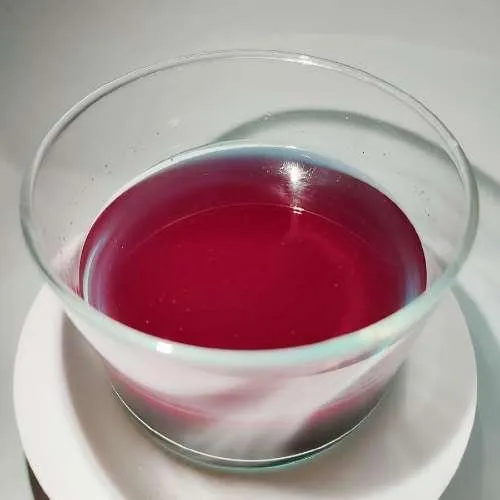
If Medication Has Failed You, Then Try NUTRITION!
IT'S NEVER TOO LATE TO CHOOSE NATURAL!


UNLOCK Superior Nutrition with Spirulina: from the Philippines' Pioneering Spirulina Farm!


Our Spirulina farm is located in the remote Agricultural Zone in Subic, Zambales, where strict quality control procedures are practiced.
Since 2006, we grow and harvest Spirulina from our very own Spirulina Farm and not imported from Ch**a or any other country. Spirulina was not yet produced here in the country at that time. It started as a family business and personal consumption and eventually became a production of various food supplements using this Superfood.
Our FLAGSHIP product, is Spirulina Filipina® Food Supplement.
Nutritionally speaking,
when used as a good source of supplementary food, Spirulina Filipina® may benefit individuals who suffer from these health conditions...


...and more!
If you do not choose to be healthy and act upon it, SOONER OR LATER YOU WILL GET SICK! Then your medical bills and all your savings WILL EAT YOU ALIVE! Choosing to be healthy is a matter of PRIORITY. It is a conscious effort.

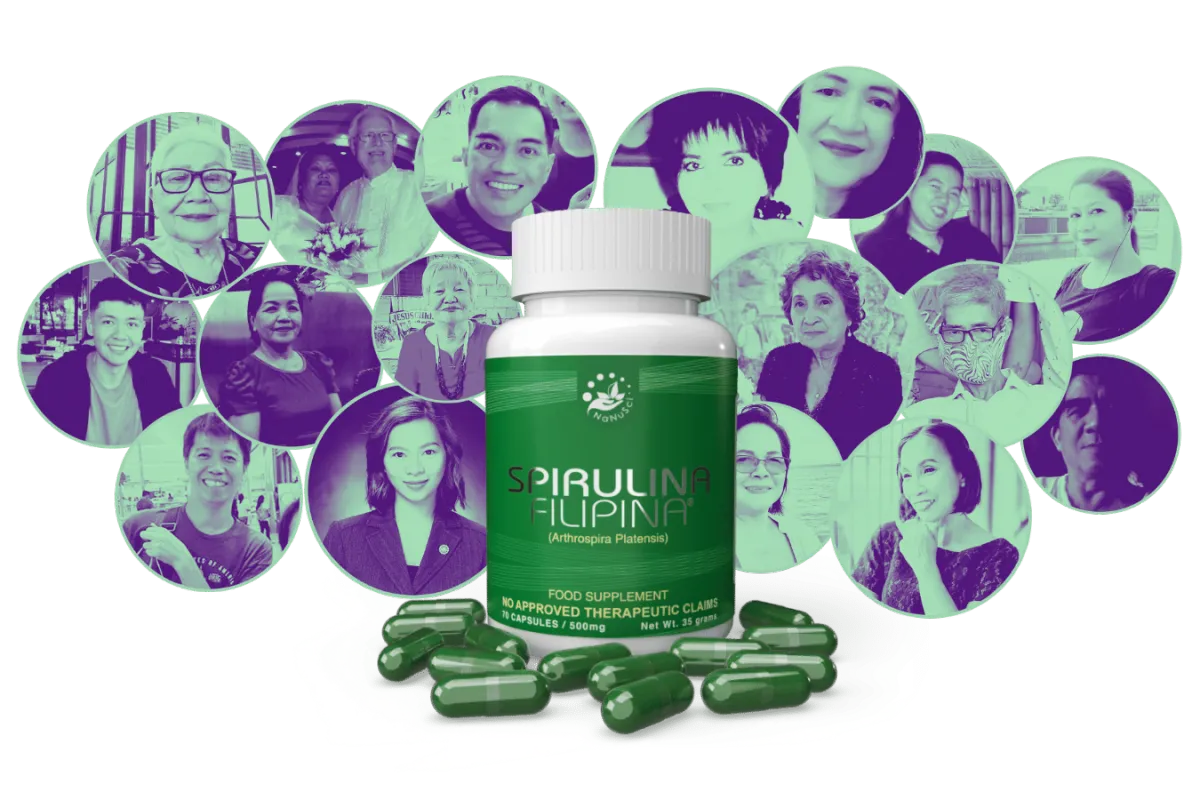
Let these TESTIMONIALS be your guide in making an informed decision...

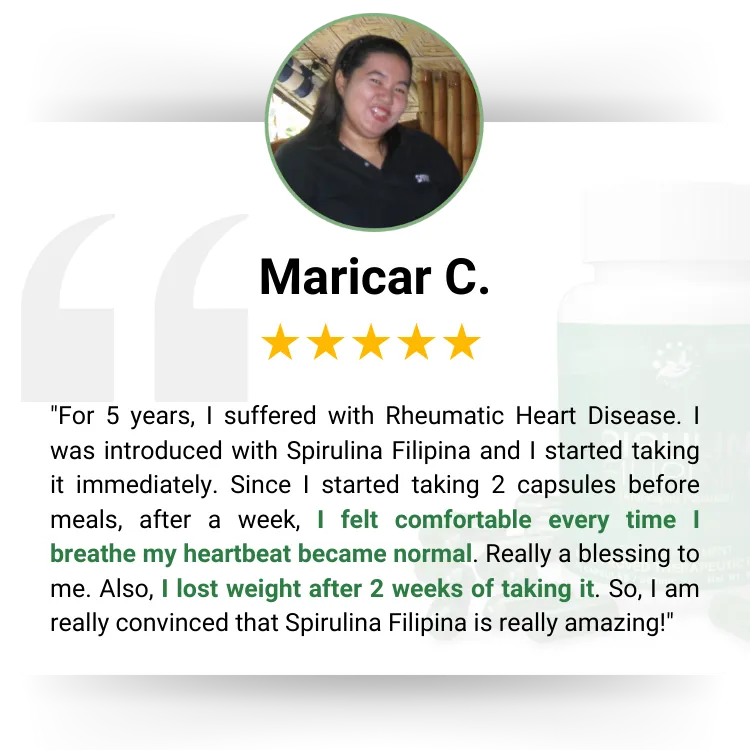
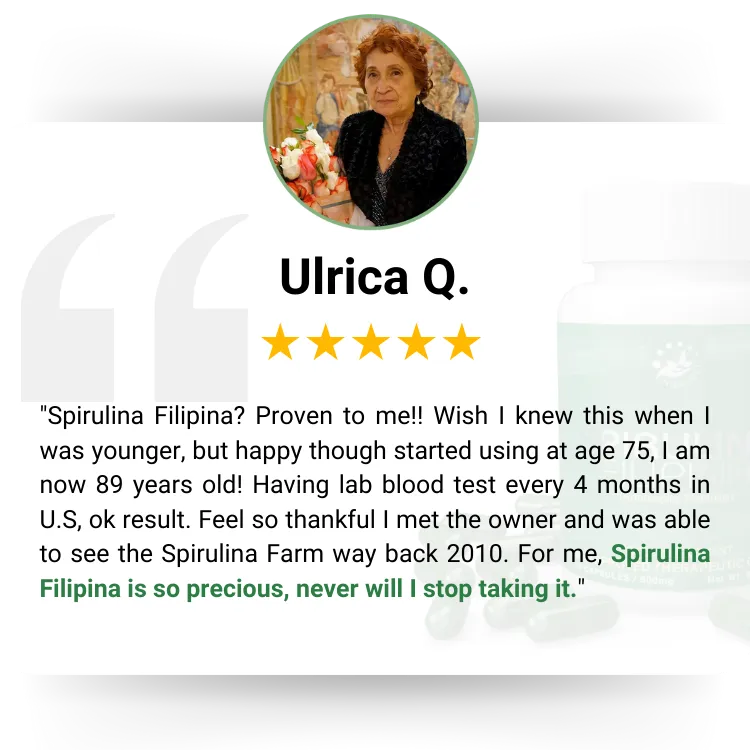






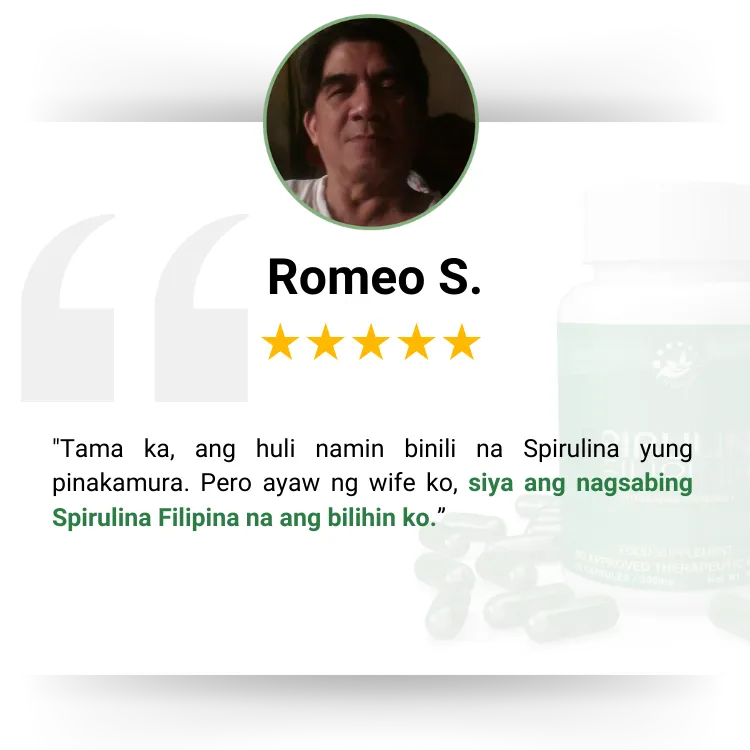


If you think WELLNESS is expensive, then try ILLNESS...
If you think
WELLNESS is expensive,
then try ILLNESS...
Video is playing, please UNMUTE to hear audio...
What is


Spirulina Filipina® is an Alkaline WHOLE food supplement made from PURE Biomass of Cyanobacteria also known as Spirulina (Arthrospira Platensis) that is not extracted from other sources but locally grown and harvested here in the Philippines.
The brand Spirulina Filipina® was introduced by Natural Nutrition Science Inc. (Nanusci Inc.) in 2009 and the trademark SPIRULINA FILIPINA was officially registered with the Intellectual Property Office (IPO) in the year 2012.

A True & Potent Spirulina MUST HAVE ALL Of These Color Pigments!
A True & Potent Spirulina MUST HAVE ALL Of These Color Pigments!
Spirulina Filipina® has ALL OF THEM!

CHLOROPHYLL
(Green)
Detoxification
Antioxidant
Wound Healing
Blood Health
Digestive Health
...and more!

PHYCOERYTHRIN
(Red/Maroon)
Antioxidant
Anti-inflammatory
Immune Support
Photoprotection
Neuroprotection
...and more!

CAROTENOIDS
(Yellow)
Vision Health
Skin Protection
Immune Boost
Antioxidant
Cancer Prevention
...and more!

PHYCOCYANIN
(Blue/Cyan)
Anti-inflammatory
Antioxidant
Cancer Prevention
Neuroprotection
Liver Protection
...and more!

CHLOROPHYLL (Green)
Detoxification: Helps bind and remove toxins and heavy metals from the body.
Antioxidant: Neutralizes free radicals, reducing oxidative stress and cellular damage.
Wound Healing: Promotes faster healing of wounds and reduces inflammation.
Blood Health: Supports the production of red blood cells and improves oxygen transport.
Digestive Health: Promotes a healthy digestive tract by maintaining a balanced gut microbiome.
PHYCOERYTHRIN (Red/Maroon)
Antioxidant: Provides powerful antioxidant effects, protecting cells from oxidative damage.
Anti-inflammatory: Helps reduce inflammation in the body, easing conditions like arthritis.
Immune Support: Enhances immune function by supporting the activity of white blood cells.
Photoprotection: Absorbs harmful light wavelengths, protecting cellular components.
Neuroprotection: Supports brain health by protecting nerve cells from damage and degeneration.


CAROTENOIDS (Yellow)
Vision Health: Protects against age-related macular degeneration and cataracts.
Skin Protection: Shields the skin from UV damage and supports overall skin health.
Immune Boost: Enhances immune response and helps fight off infections.
Antioxidant: Neutralizes free radicals, protecting cells from oxidative stress.
Cancer Prevention: Reduces the risk of certain cancers by inhibiting the growth of cancer cells.
PHYCOCYANIN (Blue/Cyan)
Anti-inflammatory:
Reduces inflammation and alleviates pain in joints and muscles.
Antioxidant:
Protects cells from oxidative damage and supports overall cellular health.
Immune Support:
Simulates the production of white blood cells, enhancing immune function.
Neuroprotection:
Protects nerve cells from damage and supports brain health.
Liver Protection:
Helps protect the liver from toxins and supports liver function.
Cancer Prevention:
Reduces the risk of certain cancers by inhibiting the growth of cancer cells.
CHLOROPHYLL (Green)
Detoxification:
Helps bind and remove toxins and heavy metals from the body.
Antioxidant:
Neutralizes free radicals, reducing oxidative stress and cellular damage.
Wound Healing:
Promotes faster healing of wounds and reduces inflammation.
Blood Health:
Supports the production of red blood cells and improves oxygen transport.
Digestive Health:
Promotes a healthy digestive tract by maintaining a balanced gut microbiome.
PHYCOERYTHRIN (Red/Maroon)
Antioxidant:
Provides powerful antioxidant effects, protecting cells from oxidative damage.
Anti-inflammatory:
Helps reduce inflammation in the body, easing conditions like arthritis.
Immune Support:
Enhances immune function by supporting the activity of white blood cells.
Photoprotection:
Absorbs harmful light wavelengths, protecting cellular components.
Neuroprotection:
Supports brain health by protecting nerve cells from damage and degeneration.
CAROTENOIDS (Yellow)
Vision Health:
Protects against age-related macular degeneration and cataracts.
Skin Protection:
Shields the skin from UV damage and supports overall skin health.
Immune Boost:
Enhances immune response and helps fight off infections.
Antioxidant:
Neutralizes free radicals, protecting cells from oxidative stress.
Cancer Prevention:
Reduces the risk of certain cancers by inhibiting the growth of cancer cells.
PHYCOCYANIN (Blue/Cyan)
Anti-inflammatory: Reduces inflammation and alleviates pain in joints and muscles.
Antioxidant: Protects cells from oxidative damage and supports overall cellular health.
Immune Support: Simulates the production of white blood cells, enhancing immune function.
Neuroprotection: Protects nerve cells from damage and supports brain health.
Liver Protection: Helps protect the liver from toxins and supports liver function.
Cancer Prevention: Reduces the risk of certain cancers by inhibiting the growth of cancer cells.

The Process of SPIRULINA FILIPINA® Farming & Manufacturing
The Process of
SPIRULINA FILIPINA®
Farming & Manufacturing
Spirulina Filipina® boasts of using only "Mother Strains" in culturing Spirulina. Most just transfer cultured Spirulina from pond to pond.
Spirulina Filipina® is cultured in the pollution-free surroundings of Zambales hills.
Spirulina Filipina® uses ponds covered in Greenhouses to ensure the safety of our living Spirulina against contamination from rain, dust, animal dirt, pollution, & other harmful elements. Many Spirulina brands are cultured in large open ponds.
Spirulina Filipina® uses a five-step water filtration system to ensure its ponds and Spirulina are free from toxins.
Spirulina Filipina® uses the slow-drying method (between 9 to 18 hours) to ensure Spirulina's maximum retention of nutrients.
Spirulina Filipina® are free from waxes, extenders and fillings to ensure that one consumes only 100% pure Spirulina. Capsule forms are enclosed in Vegetable Capsules which makes Spirulina Filipina® even more ideal for Vegetarians and individuals who doesn't eat meat.
Spirulina Filipina® contains 50% more of the blue pigment, Phycocyanin, as compared to all other brands (physical test).
Spirulina Filipina® has the complete set of color pigments: BLUE, GREEN, MAROON, and YELLOW.


want to know more about spirulina?
Frequently Asked Questions
What is Spirulina?
The name "Spirulina" was derived from the Latin word for "helix" or "spiral"; denoting the physical configuration of the organism. It is a kind of Microalgae, the tiny aquatic cousin to seaweed and kelp.
It is actually not a plant at all but a member of the bacteria kingdom, Cyanobacteria to be exact, that’s naturally found in salt water and bodies of fresh water. It’s a diet mainstay for many varieties of fish, making it a key part of the food chain.
Spirulina contains the most remarkable concentration of nutrients known in any food, plant, grain or herb.
What Nutrients can we get from Spirulina?
Spirulina is a nutrient-dense superfood packed with a wide range of major nutrients, vitamins, and minerals. Here’s a breakdown of some of the key components you can get from Spirulina:
MAJOR NUTRIENTS
Protein: Spirulina is about 60-70% protein by dry weight, making it one of the highest natural protein sources.It contains all essential amino acids, making it a complete protein.
Essential Fatty Acids: Contains omega-3 and omega-6 fatty acids, including gamma-linolenic acid (GLA).
VITAMINS
Vitamin B1 (Thiamine): Essential for energy production and carbohydrate metabolism.
Vitamin B2 (Riboflavin): Important for energy production and skin health.
Vitamin B3 (Niacin): Helps in energy production and maintaining healthy skin and nerves.
Vitamin B6 (Pyridoxine): Crucial for amino acid metabolism and neurotransmitter synthesis.
Vitamin B9 (Folate): Important for DNA synthesis and repair, and cell division.
Vitamin B12 (Cobalamin): Essential for red blood cell production and neurological function.
Vitamin A (Beta-carotene): Important for vision, immune function, and skin health.
Vitamin E: Acts as an antioxidant, protecting cells from damage.
MINERALS
Iron: Essential for oxygen transport in the blood and energy production.
Calcium: Important for bone health, muscle function, and nerve transmission.
Magnesium: Crucial for muscle and nerve function, blood glucose control, and bone health.
Phosphorus: Vital for bone health and energy production.
Potassium: Helps maintain fluid balance, muscle contractions, and nerve signals.
Zinc: Important for immune function, wound healing, and DNA synthesis.
Sodium: Essential for maintaining fluid balance and nerve function.
Manganese: Involved in bone formation, blood clotting, and reducing inflammation.
ANTIOXIDANTS
Phycocyanin: A blue pigment with powerful antioxidant and anti-inflammatory properties.
Chlorophyll: The green pigment known for its detoxifying properties.
Beta-carotene: An antioxidant that supports vision and immune function.
ADDITIONAL NUTRIENTS
Gamma-Linolenic Acid (GLA): An omega-6 fatty acid with anti-inflammatory properties.
Polysaccharides: Support immune function and provide energy.
These nutrients, vitamins, and minerals make Spirulina a highly beneficial supplement for overall health, supporting various bodily functions and contributing to improved well-being.
Is Spirulina a food or a medicine?
As we all know, some of our illnesses are caused by having insufficient nutrients in our body. These illnesses are just the symptoms to show us that we may be lacking in some nutrients. If we replenish these nutrients in time, the symptoms usually disappear. If not, we can lower the function of our immune system causing further problems.
Spirulina is not a medicine, but when used as a good source of supplementary food, you can avoid nutrient deficiencies causing illness. It is best understood as a highly nutritious food supplement that can complement a healthy diet but should not be considered a medicine.
The topic of Spirulina is currently quite hot for it's therapeutic applications. Medical research has already shown that Spirulina can provide benefits to our body.
Spirulina can help you to have reasonable levels of nutrients in your body, which will in turn give you less of the chance to get sick.
Who should take Spirulina?
Spirulina is a versatile supplement that can benefit a wide range of individuals. Here are some groups of people who may particularly benefit from taking Spirulina:
Athletes and Active Individuals
Benefit: Enhanced endurance, muscle repair, and reduced exercise-induced oxidative stress.
Reason: High protein content and rich in antioxidants help in muscle recovery and energy production.
Vegetarians and Vegans
Benefit: Complete protein source and essential nutrients like B12, which are often lacking in plant-based diets.
Reason: Spirulina provides a plant-based source of all essential amino acids and vital nutrients.
Individuals with Anemia
Benefit: Improved iron levels and hemoglobin production.
Reason: Spirulina is rich in bioavailable iron, which is crucial for people with iron-deficiency anemia.
People Looking to Boost Their Immune System
Benefit: Enhanced immune function and increased resistance to infections.
Reason: Spirulina boosts the production of white blood cells and antibodies.
Individuals with Inflammatory Conditions
Benefit: Reduced inflammation and pain relief.
Reason: Spirulina contains phycocyanin and other anti-inflammatory compounds.
Those Managing Diabetes
Benefit: Better blood sugar regulation and improved insulin sensitivity.
Reason: Spirulina helps stabilize blood sugar levels and can improve metabolic health.
People with High Cholesterol or Cardiovascular Concerns
Benefit: Lower LDL cholesterol and triglycerides, and improved heart health.
Reason: Spirulina helps improve lipid profiles and reduce blood pressure.
Individuals Seeking Weight Loss and Management
Benefit: Increased satiety and reduced overall caloric intake.
Reason: Spirulina’s high protein content helps in appetite control and promotes a feeling of fullness.
Older Adults
Benefit: Improved nutrient intake, protection against age-related conditions, and enhanced vitality.
Reason: Spirulina provides essential nutrients that may be lacking in the diets of older adults.
People with Detoxification Needs
Benefit: Enhanced detoxification and elimination of heavy metals and toxins.
Reason: Spirulina’s chlorophyll and other compounds support liver function and detox processes.
Individuals with Poor Digestive Health
Benefit: Improved digestion and gut health.
Reason: Spirulina supports a healthy gut microbiome and aids in digestion.
People Seeking Better Skin and Hair Health
Benefit: Improved skin complexion and hair growth.
Reason: The vitamins and antioxidants in Spirulina promote healthy skin and hair.
Those Looking for a Natural Energy Boost
Benefit: Increased energy levels and reduced fatigue.
Reason: Spirulina’s nutrient-dense profile provides sustained energy.
Individuals Focused on Preventive Health
Benefit: Overall wellness and disease prevention.
Reason: Spirulina’s comprehensive nutrient profile supports overall health and helps prevent various conditions.
Pregnant and Breastfeeding Women
Benefit: Enhanced nutrition for mother and baby (after consulting with a healthcare provider).
Reason: Spirulina provides essential nutrients that support maternal and fetal health.
Children Who Don’t Like Vegetables
Benefit: Improved nutrient intake and overall health.
Reason: Spirulina provides essential vitamins and minerals that children might miss out on if they avoid vegetables.
Growing Teenagers
Benefit: Support for rapid growth and development, enhanced energy levels.
Reason: Spirulina offers a rich source of proteins, vitamins, and minerals that support the nutritional needs of growing teenagers.
Animals (Pets and Livestock)
Benefit: Enhanced coat health, improved digestion, and boosted immune function.
Reason: Spirulina can be added to animal feed to provide essential nutrients that support overall health and vitality in pets and livestock.
While Spirulina offers numerous health benefits, it’s important for individuals to consult with a healthcare provider before starting any new supplement, especially if they have pre-existing health conditions or are taking other medications.
Who should not take 'TOO MUCH' Spirulina?
While Spirulina is generally considered safe for most people, there are certain groups who should avoid taking too much or may need to avoid it altogether. Here are some groups of people who should be CAUTIOUS about taking more than enough Spirulina:
Individuals with Autoimmune Diseases
Reason: Spirulina can stimulate the immune system, taking too much might worsen autoimmune conditions like multiple sclerosis, lupus, hyperthyroidism and others.
People with Phenylketonuria (PKU)
Reason: Spirulina contains phenylalanine, which individuals with PKU cannot metabolize properly.
Those with Serious Allergies to Algae
Reason: Individuals who have allergies to algae or similar supplements might experience allergic reactions especially on high dosage.
Individuals with Kidney Disease (too much PROTEIN)
Reason: For those with pre-existing kidney conditions, the high protein content in Spirulina can put a strain on the kidneys, especially if taken in large dosage.
People with Hyperthyroid Condition
Reason: Spirulina contains Iodine, which can affect thyroid function if taken too much. Those with Hyperthyroid should consult a healthcare provider before use.
Individuals Taking Blood-Thinning Medications
Reason: Spirulina can have an anticoagulant effect, which might interfere with blood-thinning medications like warfarin, increasing the risk of bleeding.
Individuals with Phenylalanine Sensitivity
Reason: Spirulina contains phenylalanine, which some individuals might need to limit in their diet.
People with Iron Overload Disorders
Reason: Spirulina is rich in iron, which could be problematic for those with conditions like hemochromatosis where iron accumulates in the body.
GENERAL PRECAUTIONS
Contaminated Spirulina: Spirulina can sometimes be contaminated with harmful substances like microcystins, heavy metals, or bacteria if not sourced from reputable suppliers. Always choose high-quality, tested products, such as Spirulina Filipina®.
Digestive Issues: Some people may experience gastrointestinal discomfort when taking Spirulina, especially in large amounts. It's advisable to start with a small dose and gradually increase it.
Before adding Spirulina to your diet, especially if you belong to any of these groups, it is recommended to consult with a healthcare provider to determine the appropriate dosage and ensure it is safe for your specific health conditions.
Can I take it along with my 'Maintenance' medications?
There are no reports in the scientific literature to suggest that Spirulina interacts with any conventional medications. However, it is possible that Spirulina might interfere with drugs given to suppress the immune system. People taking drugs to lower their blood sugar or cholesterol levels can also take Spirulina. Just make sure to monitor these levels to not go 'too low'.
How digestible is Spirulina?
Spirulina builds soft cell walls from a network of proteins, polysaccharides and enzymes. It just melts away inside your body. This is important for those who suffer from poor digestion, or for older people with restricted diets.
How does Spirulina help in 'Weight Loss'?
Spirulina is not a weight loss product, but it offers an excellent natural support in the struggle against putting on weight. Most weight loss products focus on eating less. But by eating less, you will also get less nutrients.
Spirulina makes sure that the body receives enough nutrients. Spirulina can help control and maintain your weight without artificial cures. You will receive natural nutrients in concentrated form without excess calories, which will keep you healthier and make you feel less hungry. Losing weight without feeling tired or restless is much easier to keep up! Spirulina half an hour before your meal, so your body will get the necessary nutrients.
Because Spirulina is easily digestible, these building materials will be quickly transported to the blood. The brain’s hunger center will then receive a message via the blood that all nutrients are present, which makes your feeling of hunger disappear.
The advantage is that Spirulina is 100% natural, without any harmful substances. Spirulina is also filled with iron, which is lacking in many low-calorie diets. Finally, Spirulina contains an extraordinary low quantity of calories and kilojoules (only 7 calories or 27 kilojoules per 6 tablets).
Can Spirulina help me build Muscles?
Spirulina is a nutrient-dense superfood that offers several benefits for gym goers and those looking to build muscle. Here are some key benefits:
• Rich in Protein: Spirulina is composed of about 60-70% protein by dry weight, making it an excellent source of plant-based protein. This helps in muscle repair and growth.
• Essential Amino Acids: Spirulina contains all essential amino acids required for muscle protein synthesis, making it a complete protein source.
• Antioxidant Properties: Spirulina is rich in antioxidants, particularly phycocyanin, which can help reduce oxidative stress and muscle inflammation caused by intense workouts.
• Improved Endurance: Some studies suggest that Spirulina can enhance endurance by increasing the time it takes for muscles to become fatigued, allowing for longer and more effective workouts.
• Boosts Immune System: Spirulina's high nutrient content, including vitamins and minerals, supports the immune system, which is essential for recovery and overall health.
• Energy Boost: The vitamins, minerals, and fatty acids in Spirulina can help increase energy levels and reduce fatigue, helping gym goers stay active and perform better during workouts.
• Iron Content: Spirulina is a good source of iron, which is vital for oxygen transport in the blood, thereby improving muscle oxygenation and performance.
• Reduces Muscle Damage: The anti-inflammatory properties of Spirulina can help reduce muscle soreness and damage post-exercise, aiding in quicker recovery.
• Fat Metabolism: Spirulina may help improve fat metabolism, which can be beneficial for those looking to reduce body fat while maintaining muscle mass.
• Rich in Vitamins and Minerals: Spirulina provides a wide range of vitamins (B1, B2, B3, B6, B12, C, D, E) and minerals (calcium, magnesium, zinc, selenium), which are essential for overall health, muscle function, and recovery.
Can children take Spirulina?
Spirulina is just a food and can be given to children. In fact, it’s a great benefit to children who don’t like to eat vegetables. Spirulina will provide their bodies with the right vitamins and minerals which they are lacking at that moment. Spirulina can be given from birth. The powder can be easily mixed in a milk formula, smoothie or a shake. Depending on the age of the child, the dosage should be decreased from that of an adult which is one teaspoon or six 500mg Spirulina Filipina Capsules or 12 pcs. in 250mg. tablet.
Can a Pregnant woman take Spirulina?
Yes! As Spirulina has a high nutritional value, it is nutritional for both the mother and her unborn child. In addition, it provides the mother with extra nutrients, such as iron and folic acid, without the extra fat and carbohydrates. Spirulina also contains the provitamin A Beta-carotene. Beta-carotene is transformed by the body into vitamin A, as soon as the body recognizes there is any insufficiency. If the body has sufficient vitamin A, the beta-carotene is simply excreted. This is how it is different from vitamin A, of which a surplus can be stored in the liver which can cause an overdose.
Can I give Spirulina to my Pets?
Yes, of course! Spirulina are not only for humans, our furry loved ones can take it too. These are some of the key benefits that Spirulina can do with our pets, as well as us humans:
• It can strengthen their Immune System.
• It can cleanse the body of Toxins.
• It can improve Digestion and Gastrointestinal health.
• It can improve overall Skin & Coat health.
Spirulina is also found to be a highly nutritious potential feed resource for many agriculturally important animal species.
Research findings have associated Spirulina to improvements in animal growth, fertility, aesthetic and nutritional product quality.
Spirulina intake has also been linked to an improvement in animal health and welfare. Its influence over animal development stems from its nutritive and protein-rich composition, thus leading to an increased commercial production to meet consumer demand.
Are there any 'Side Effects' when taking Spirulina?
None. Spirulina is not medication, but a nutrient. Just as you do not experience any side effects from eating fresh fruit and vegetables, you will not experience any side effects when using Spirulina.
At first, some people can experience a rash, mild nausea, stomach pains or headaches from Spirulina. This is common in people whose metabolism is not working properly and in people who are taking, or have taken, many medicines. However, these reactions are a positive sign and are linked to the powerful cleansing power of Spirulina (the soaking off of toxic and waste products in the body).
If this is the case, you can stop taking Spirulina for a few days, or temporarily lower the dose, which causes the cleansing process to progress more gradually. Afterwards, the dose can be slowly increased again. Normally, these reactions will disappear by themselves after a few days.
BEWARE OF FAKE!!!
This is the Authentic Spirulina Filipina®
To ensure you receive the genuine benefits of Spirulina Filipina®, it is crucial to be aware of counterfeit products. Here’s what you should know:
The word "SPIRULINA FILIPINA" on the label is written in silver chrome.
Must have the word "Arthrospira Platensis" under the product name.
It should have a circular holographic Nanusci Inc. sticker on the left side of the bottle.
Most importantly, the Spirulina must have all the Four Color Pigments. We have a demonstration video on our Facebook Page on how to test the color pigments of a Spirulina.
Your health and safety are our top priorities. To ensure that you really get the AUTHENTIC Spirulina Filipina® food supplement, purchase and make transactions from this website ONLY.
Using fake Spirulina products can be harmful and will not provide the health benefits you seek. Stay safe and ensure you’re getting the genuine Spirulina Filipina® by following these guidelines.
FDA Registration

Spirulina Research & Clinical Studies
Since the 1980s, Spirulina has been the subject of dozens of scientific studies by researchers around the world.
Ayehunie S. & al. : Inhibition of HIV-1 replication by an aqueous extract of Spirulina platensis (Arthrospira platensis). J Acquir Immune Defic Syndr Hum Retrovirol. 1998 May 1;18(1):7-12.
Banji D. & al. : Investigation on the role of Spirulina platensis in ameliorating behavioural changes, thyroid dysfunction and oxidative stress in offspring of pregnant rats exposed to fluoride. Food Chem. 2013 Sep 1;140(1-2):321-31. doi: 10.1016/j.foodchem.2013.02.076.
Bhat VB. & al. : C-phycocyanin: a potent peroxyl radical scavenger in vivo and in vitro. Biochem Biophys Res Commun. 2000 Aug 18;275(1):20-5.
Braakhuis AJ. & al. : Impact of Dietary Antioxidants on Sport Performance: A Review. Sports Med. 2015 Jul;45(7):939-55. doi: 10.1007/s40279-015-0323-x.
Chamorro G. & al. : Reproductive and peri- and postnatal evaluation of Spirulina maxima in mice. Journal of Applied Phycology, April 1997, Volume 9, Issue 2, pp 107–112
Gutiérrez-Salmeán G. & al. : Nutritional and toxicological aspects of spirulina (arthrospira). Nutr Hosp. 2015 Jul 1;32(1):34-40. doi: 10.3305/nh.2015.32.1.9001.
Hayakawa Y. & al. : Heparin cofactor II-dependent antithrombin activity of calcium spirulan. Blood Coagul Fibrinolysis. 1996 Jul;7(5):554-60.
Hayashi O. & al. : Class specific influence of dietary Spirulina platensis on antibody production in mice. J Nutr Sci Vitaminol (Tokyo). 1998 Dec;44(6):841-51.
Hayashi O. & al. : Enhancement of antibody production in mice by dietary Spirulina platensis. J Nutr Sci Vitaminol (Tokyo). 1994 Oct;40(5):431-41.
Hirata T. & al. : Antioxidant activities of phycocyanobilin prepared from Spirulina platensis. Journal of Applied Phycology, October 2000, Volume 12, Issue 3–5, pp 435–439
Hwang JH. & al. : Spirulina prevents memory dysfunction, reduces oxidative stress damage and augments antioxidant activity in senescence-accelerated mice. J Nutr Sci Vitaminol (Tokyo). 2011;57(2):186-91.
Kalafati M. & al. : Ergogenic and antioxidant effects of spirulina supplementation in humans. Med Sci Sports Exerc. 2010 Jan;42(1):142-51. doi: 10.1249/MSS.0b013e3181ac7a45.
Kapoor R. & al. : Effect of supplementation of blue green alga (Spirulina) on outcome of pregnancy in rats. Plant Foods Hum Nutr. 1993 Jan;43(1):29-35.
Kim H. & al. (1998). Inhibitory effect of mast cellmediated immediate-type allergic reactions in rats by Spirulina. Biochemical Pharmacology, Volume 55, Issue 7, 1 April 1998, Pages 1071-1076.
Kulshreshtha A. & al. : Spirulina in health care management. Curr Pharm Biotechnol. 2008 Oct;9(5):400-5.
Kumari RP. & al. : C-phycocyanin modulates selenite-induced cataractogenesis in rats. Biol Trace Elem Res. 2013 Jan;151(1):59-67. doi: 10.1007/s12011-012-9526-2.
Lisheng L. & al. (1991). Inhibitive effect and mechanism of polysaccharide of Spirulina platensis on transplanted tumor in mice. Marine Sciences, 1991-05
Liu Y. & al. (2000). Inhibitory effect of phycocyanin from Spirulina platensis on the growth of human leukemia K562 cells. Journal of Applied Phycology, March 2000, Volume 12, Issue 2, pp 125–130.
Loke MF. & al. : Antiadhesive property of microalgal polysaccharide extract on the binding of Helicobacter pylori to gastric mucin. FEMS Immunol Med Microbiol. 2007 Jul;50(2):231-8.
M. A. Qureshi & R. A. Ali (2008) Spirulina Platensis Exposure Enhances Macrophage Phagocytic Function in Cats, Immunopharmacology and Immunotoxicology, 18:3, 457-463, DOI: 10.3109/08923979609052747.
M. A. Qureshi DVM, PhD, M. T. Kidd PhD & R. A. Ali MS (2008) Spirulina platensis Extract Enhances Chicken Macrophage Functions After in vitro Exposure,Journal of Nutritional Immunology, 3:4, 35-45, DOI: 10.1300/J053v03n04_04.
M. A. Qureshi, J. D. Garlich & M. T. Kidd (2008) Dietary Spirulina Platensis Enhances Humoral and Cell-Mediated Immune Functions in Chickens,Immunopharmacology and Immunotoxicology, 18:3, 465-476, DOI: 10.3109/08923979609052748.
Mao TK. & al. : Effects of a Spirulina-based dietary supplement on cytokine production from allergic rhinitis patients. J Med Food. 2005 Spring;8(1):27-30.
Martínez-Galero E. & al. : Preclinical antitoxic properties of Spirulina (Arthrospira). Pharm Biol. 2016 Aug;54(8):1345-53. doi: 10.3109/13880209.2015.1077464.
Matondo FK. & al. : Spirulina Supplements Improved the Nutritional Status of Undernourished Children Quickly and Significantly: Experience from Kisantu, the Democratic Republic of the Congo. Int J Pediatr. 2016;2016:1296414.
Miczke, M. & al. (2016). Effects of spirulina consumption on body weight, blood pressure, and endothelial function in overweight hypertensive Caucasians: a double-blind, placebo-controlled, randomized trial. European Review for Medical and Pharmacological Sciences 2016; 20: 150-156.
Miranda MS. & al. : Antioxidant activity of the microalga Spirulina maxima. Braz J Med Biol Res. 1998; 31:1075-1079.
Mishima T. & al. : Inhibition of tumor invasion and metastasis by calcium spirulan (Ca-SP), a novel sulfated polysaccharide derived from a blue-green alga, Spirulina platensis. Clin Exp Metastasis. 1998 Aug;16(6):541-50.
Piñero Estrada JE. & al. (2001). Antioxidant activity of different fractions of Spirulina platensisprotean extract. Il Farmaco, Volume 56, Issues 5–7, 1 July 2001, Pages 497-500 Repéré à http://www.sciencedirect.com/science/article/pii/S0014827X01010849
Puyfoulhoux G. & al. : Iron availability from iron-fortified spirulina by an in vitro digestion/Caco-2 cell culture model. J Agric Food Chem. 2001 Mar;49(3):1625-9.
Qishen P. & al. : Radioprotective effect of extract from Spirulina platensis in mouse bone marrow cells studied by using the micronucleus test. Toxicol Lett. 1989 Aug;48(2):165-9.
Reddy CM. & al. : Selective inhibition of cyclooxygenase-2 by C-phycocyanin, a biliprotein from Spirulina platensis. Biochem Biophys Res Commun. 2000 Nov 2;277(3):599-603.
Rimbau V. & al. : Protective effects of C-phycocyanin against kainic acid-induced neuronal damage in rat hippocampus. Neurosci Lett. 1999 Dec 3;276(2):75-8.
Romay C. & al. : Antioxidant and anti-inflammatory properties of C-phycocyanin from blue-green algae. Inflamm Res. 1998 Jan;47(1):36-4.
Romay C. & al. (2002). Further studies on anti-inflammatory activity of phycocyanin in some animal models of inflammation. – Inflammation Research, August 1998, Volume 47, Issue 8, pp 334–338.
Salazar M. & al. : Subchronic toxicity study in mice fed Spirulina maxima. J Ethnopharmacol. 1998 Oct;62(3):235-41.
Śmieszek A. & al. : The Influence of Spirulina platensisFiltrates on Caco-2 Proliferative Activity and Expression of Apoptosis-Related microRNAs and mRNA. Long P, ed. Marine Drugs. 2017;15(3):65. doi:10.3390/md15030065.
Torres-Durán PV. & al. : Spirulina maxima prevents induction of fatty liver by carbon tetrachloride in the rat. Biochem Mol Biol Int. 1998 Apr;44(4):787-93.
Torres-Durán PV. & al. : Studies on the preventive effect of Spirulina maxima on fatty liver development induced by carbon tetrachloride, in the rat. J Ethnopharmacol. 1999 Feb;64(2):141-7.
Yogianti F. & al. : Inhibitory effects of dietary Spirulina platensis on UVB-induced skin inflammatory responses and carcinogenesis. J Invest Dermatol. 2014 Oct;134(10):2610-2619. doi: 10.1038/jid.2014.188.
Zhi-gang Z. & al. (1997) Study on the isolation, purification and antioxidation properties of polysaccharides from Spirulina maxima. Acta Botanica Sinica, 01 Jan 1997, 39(1):77-81.
Bachstetter AD. & al. : Spirulina Promotes Stem Cell Genesis and Protects against LPS Induced Declines in Neural Stem Cell Proliferation. Ikezu T, ed. PLoS ONE. 2010;5(5):e10496. doi:10.1371/journal.pone.0010496.
Ciferri O. (1983). Spirulina, the edible microorganism. MICROBIOLOGICAL REVIEWS, Dec. 1983, p. 551-578 Vol. 47, No. 4 0146-0749/83/040551-28$02.00/0 Copyright © 1983, American Society for Microbiology.
Hayashi T. (2008). Studies on evaluation of natural products for antiviral effects and their applications.
Hernández Lepe MA. & al. (2015). Spirulina and its hypolipidemic and antioxidant effects in humans: a systematic review. Nutr Hosp. 2015 Aug 1;32(2):494-500. doi: 10.3305/nh.2015.32.2.9100.
Ismail M. & al. : Effect of Spirulina Intervention on Oxidative Stress, Antioxidant Status, and Lipid Profile in Chronic Obstructive Pulmonary Disease Patients. BioMed Research International. 2015;2015:486120. doi:10.1155/2015/486120.
Ismail MF. & al. : Chemoprevention of rat liver toxicity and carcinogenesis by Spirulina. International Journal of Biological Sciences. 2009;5(4):377-387.
Jensen GS. & al. : Clinical Safety of a High Dose of Phycocyanin-Enriched Aqueous Extract from Arthrospira (Spirulina) platensis: Results from a Randomized, Double-Blind, Placebo-Controlled Study with a Focus on Anticoagulant Activity and Platelet Activation. Journal of Medicinal Food. 2016;19(7):645-653. doi:10.1089/jmf.2015.0143.
Kok Y-Y. & al. : Inhibitory activities of microalgal extracts against Epstein-Barr virus DNA release from lymphoblastoid cells . Journal of Zhejiang University Science B. 2011;12(5):335-345. doi:10.1631/jzus.B1000336.
Koníčková R. & al. (2014). Anti-cancer effects of blue-green alga Spirulina platensis, a natural source of bilirubin-like tetrapyrrolic compounds. Annals of hepatology March April, Vol 13 No. 1, 2014 : 273-283.
Li Y-J, Han Z, Ge L, et al. C-phycocyanin protects against low fertility by inhibiting reactive oxygen species in aging mice. Oncotarget. 2016;7(14):17393-17409. doi:10.18632/oncotarget.8165.
Marcel A-K. & al. : The Effect of Spirulina platensis versusSoybean on Insulin Resistance in HIV-Infected Patients: A Randomized Pilot Study. Nutrients. 2011;3(7):712-724. doi:10.3390/nu3070712.
Nagaoka S. & al. : A Novel Protein C-Phycocyanin Plays a Crucial Role in the Hypocholesterolemic Action of Spirulina platensis Concentrate in Rats, The Journal of Nutrition, Volume 135, Issue 10, 1 October 2005, Pages 2425–2430.
Ngo-Matip M-E. & al. : Effects of Spirulina platensis supplementation on lipid profile in HIV–infected antiretroviral naïve patients in Yaounde – Cameroon: a randomized trial study. Lipids in Health and Disease. 2014;13:191. doi:10.1186/1476-511X-13-191.
Ngo-Matip M-E. & al. : Impact of daily supplementation of Spirulina platensis on the immune system of naïve HIV-1 patients in Cameroon: a 12-months single blind, randomized, multicenter trial. Nutrition Journal. 2015;14:70. doi:10.1186/s12937-015-0058-4.
Okuyama H. & al. : Spirulinalipopolysaccharides inhibit tumor growth in a Toll-like receptor 4-dependent manner by altering the cytokine milieu from interleukin-17/interleukin-23 to interferon-γ. Oncology Reports. 2017;37(2):684-694. doi:10.3892/or.2017.5346.
Simpore J. & al. : Nutrition rehabilitation of undernourished children utilizing Spiruline and Misola. Nutrition Journal. 2006;5:3. doi:10.1186/1475-2891-5-3.
Torres-Duran PV. & al. : Antihyperlipemic and antihypertensive effects of Spirulina maxima in an open sample of mexican population: a preliminary report. Lipids in Health and Disease. 2007;6:33. doi:10.1186/1476-511X-6-33.
Torres-Durán PV. & al. : Effect of Spirulina maxima on Postprandial Lipemia in Young Runners: A Preliminary Report. Journal of Medicinal Food. 2012;15(8):753-757. doi:10.1089/jmf.2011.0309.
Wang J. & al. : Vitamin A equivalence of spirulina β-carotene in Chinese adults as assessed by using a stable-isotope reference method, The American Journal of Clinical Nutrition, Volume 87, Issue 6, 1 June 2008, Pages 1730–1737.
Wu L-C. & al. : Antimelanogenic effect of c-phycocyanin through modulation of tyrosinase expression by upregulation of ERK and downregulation of p38 MAPK signaling pathways. Journal of Biomedical Science. 2011;18(1):74. doi:10.1186/1423-0127-18-74.
Yang L. & al. : Inhibitory effects of polysaccharide extract from Spirulina platensis on corneal neovascularization. Molecular Vision. 2009;15:1951-1961.
Yang Y. & al. : In vitro and in vivo safety assessment of edible blue-green algae, Nostoc commune var. sphaeroides Kützing and Spirulina plantensis. Food and chemical toxicology : an international journal published for the British Industrial Biological Research Association. 2011;49(7):1560-1564. doi:10.1016/j.fct.2011.03.052.
Zeinalian R. & al. : The effects of Spirulina Platensis on anthropometric indices, appetite, lipid profile and serum vascular endothelial growth factor (VEGF) in obese individuals: a randomized double blinded placebo controlled trial. BMC Complementary and Alternative Medicine. 2017;17:225. doi:10.1186/s12906-017-1670-y.
Zheng J. & al. (2013). Phycocyanin and phycocyanobilin from Spirulina platensis protect against diabetic nephropathy by inhibiting oxidative stress. Cardiovascular and Renal Integration,15 Jan 2013.
Let FOOD be thy medicine,
and MEDICINE be thy food.
- Hippocrates (The Father of Medicine)

Disclaimer: The testimonials provided on SpiruShop are from real customers who have used Spirulina Filipina and shared their personal experiences. Individual results may vary and are not guaranteed. These testimonials reflect the unique experiences of the individuals and may not be representative of all users. SpiruShop does not claim that all customers will achieve similar results.
SpiruShop is an authorized online distribution channel for Spirulina Filipina. We are dedicated to providing high-quality products and excellent customer service. Any statements regarding the health benefits of Spirulina Filipina have not been evaluated by the Food and Drug Administration and are not intended to diagnose, treat, cure, or prevent any disease. Always consult with a healthcare professional before starting any new dietary supplement.
By using our website and purchasing our products, you acknowledge and accept these terms and conditions.
Spirulina Filipina® Price DISCOUNTS will end in...
Copyrights 2024 | SpiruShop




